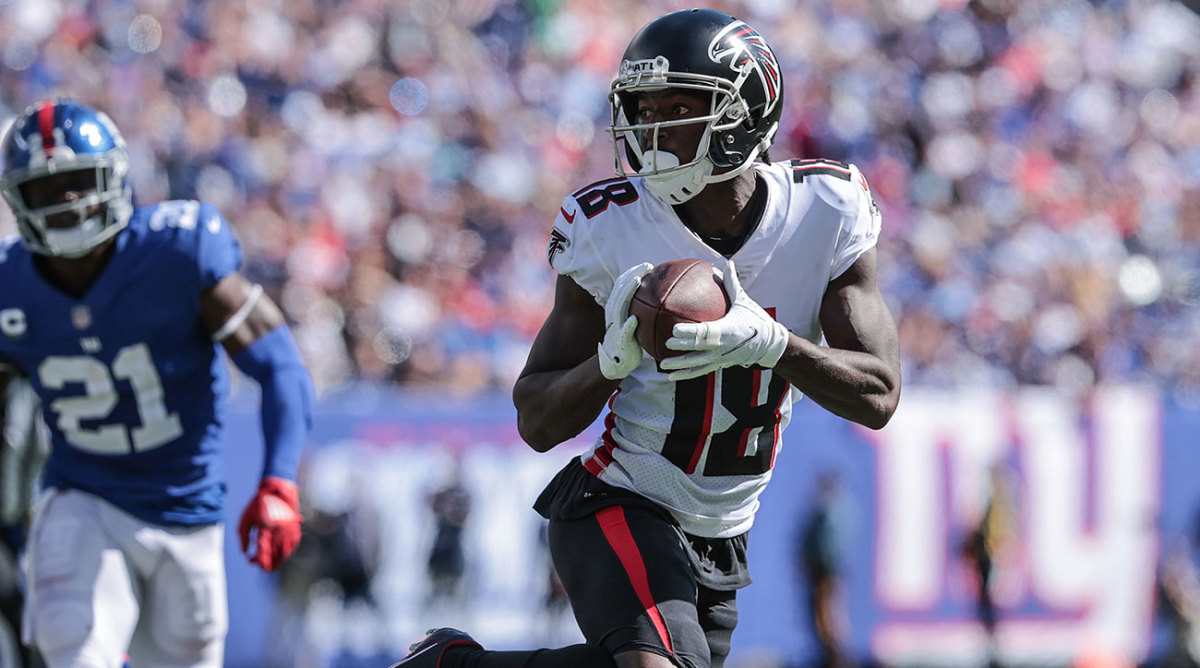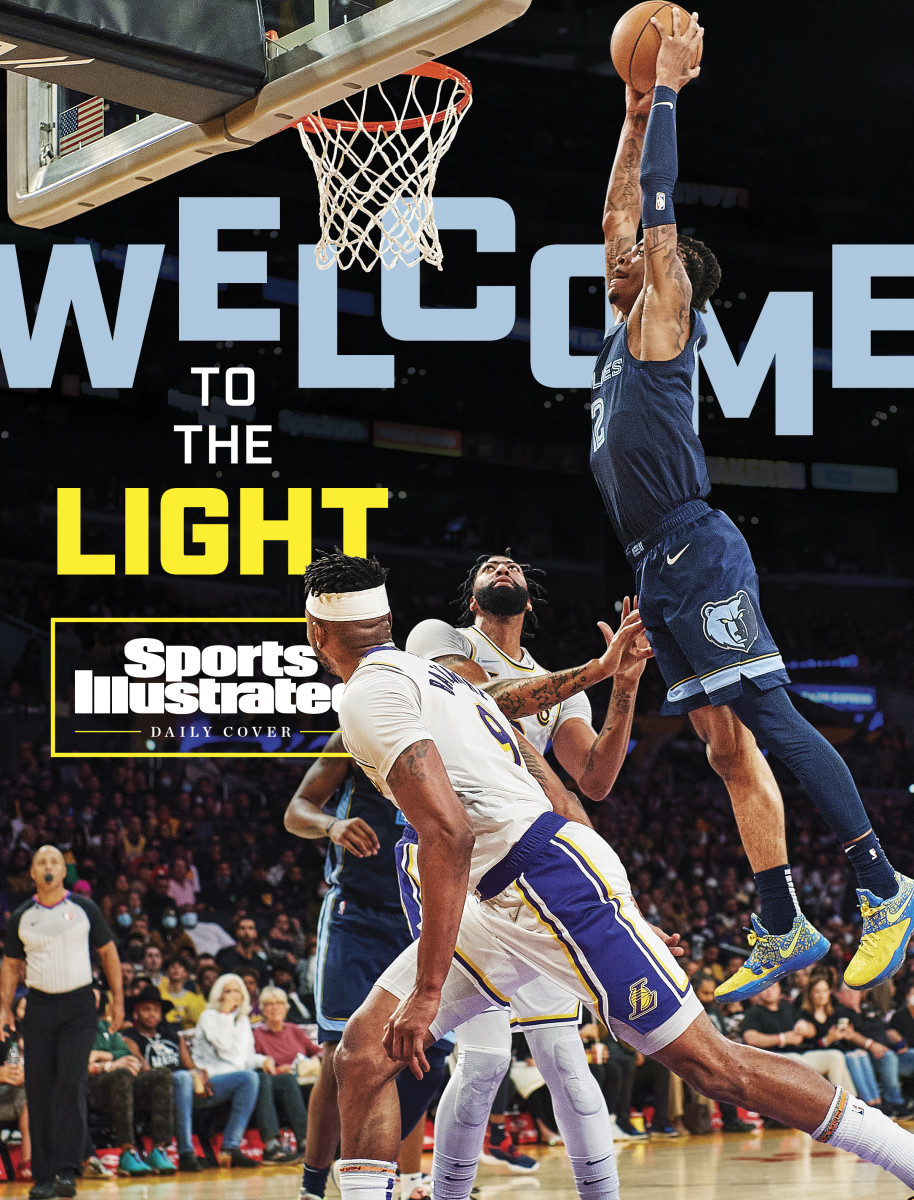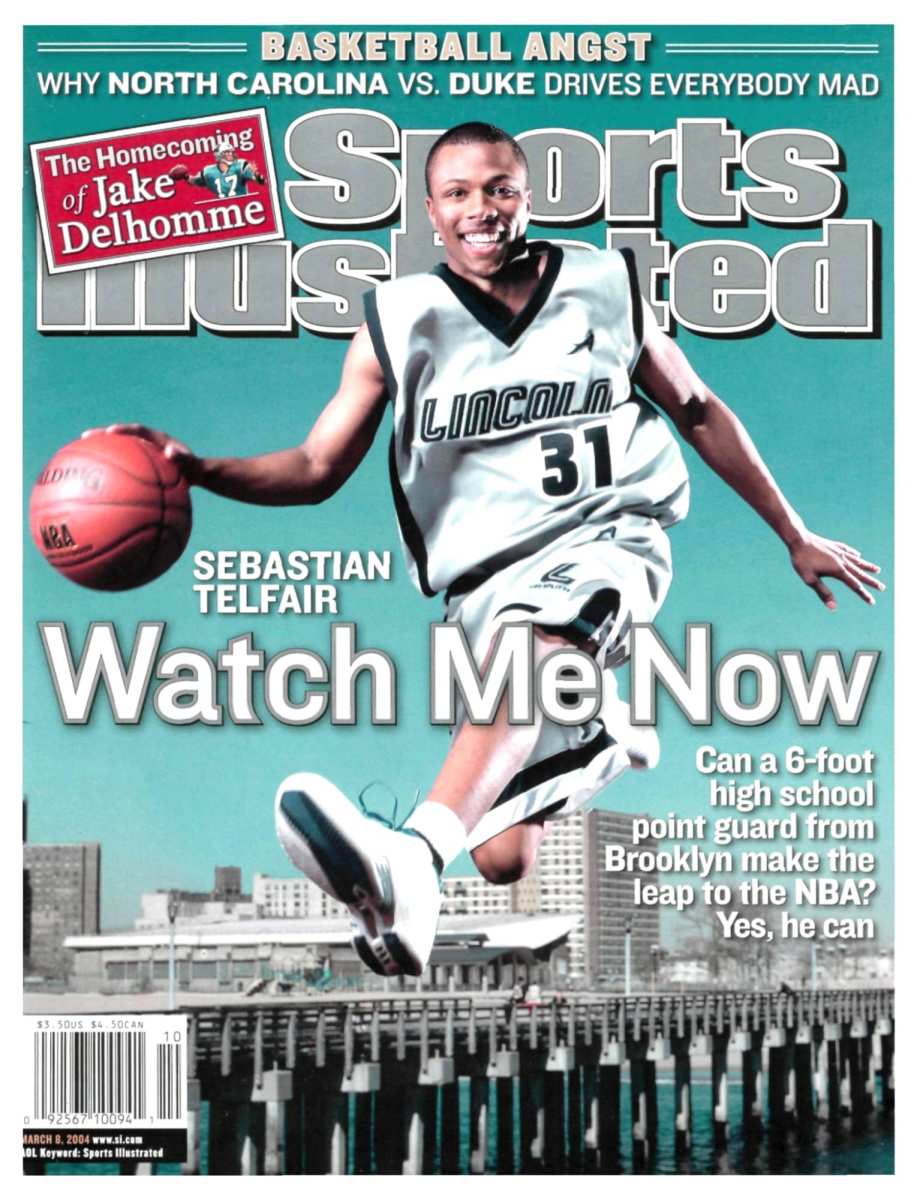SI:AM | Calvin Ridley and the NFL’s Gambling Problem
Good morning, I’m Dan Gartland. Here’s everything we know about the Calvin Ridley suspension.
If you're reading this on SI.com, you can sign up to get this free newsletter in your inbox each weekday at SI.com/newsletters.
The NFL made it clear where its priorities lie

The NFL made an example out of Calvin Ridley. The league announced yesterday that the Falcons’ receiver had been suspended indefinitely (at least through the end of the 2022 season) for placing bets on NFL games.
Here are the details that we know so far:
- Ridley placed fewer than 10 bets using his phone, including three-, five- and eight-game parlays, SI’s Albert Breer reports.
- Ridley placed bets on the Falcons but only picked them to win.
- The bets were placed after Ridley stepped away from the team to address his mental health.
- Ridley says he bet a total of $1,500.
- His wagers were flagged to the NFL by the app he placed them on, Hard Rock Sportsbook, Breer reports.
- Ridley was in Florida when he placed the bets and his presence outside the state of Georgia was part of the reason why his bets were flagged, according to Breer.
An active NFL player should obviously not be betting on NFL games, but the league’s response to Ridley’s mistake seems more like damage control to appease its gambling partners than to address concerns about the “integrity of the game.” The NFL’s investigation found no evidence that any players, coaches or staff members knew about Ridley’s bets, and his wagers were for relatively small amounts over a short period of time. We’re not talking about a player who bet the house trying to persuade teammates to shave points. But any semblance of impropriety is bad for the rapidly growing legalized sports gambling industry, and so the NFL dropped the hammer on Ridley, not only suspending him for an entire season (or more) but also scolding him in a letter from commissioner Roger Goodell.
“Your actions put the integrity of the game at risk, threatened to damage public confidence in professional football, and potentially undermined the reputations of your fellow players throughout the NFL,” Goodell wrote in part.
Anyone who has followed sports since the great DFS frenzy of 2015 and the ensuing state-by-state expansion of legalized gambling shouldn’t be surprised that the NFL would prioritize its lucrative gambling deals over the fairness of a punishment handed out to a nonstar player.
Conor Orr writes that the Ridley situation is yet another instance of the NFL’s punishing players more harshly than owners:
“It’s like a reality show, with little, tiny pieces the league can control, using players’ real-life decisions and shortcomings to shield against the actual issues, the ones that will really matter when it comes to game integrity.”
Although Ridley’s bets and suspension is the major test of pro sports leagues’ embrace of gambling (the NFL suspended Josh Shaw for betting on games in 2019, but the gambling landscape has changed considerably in the short time since then), it certainly won’t be the last. Gambling has always been intertwined with the NFL and recent laws have made it only more palatable, but there are notable NFL figures with closer ties to gambling than Ridley. Patriots owner Robert Kraft and ESPN reporter Adam Schefter are investors in the same gambling app, but you don’t read letters from Roger Goodell expressing concern about how a prominent owner might benefit financially from bets involving his team.
If there’s one thing the Ridley case makes clear it’s that the NFL is all-in on gambling. In a vastly different universe, the league might have used Ridley’s situation to ask questions about how involved it should be in the gambling business. But in this universe, the one where the NFL expects to bring in $1 billion in annual revenue from gambling by the end of the decade, Ridley was always going to be hung out to dry.
The best of Sports Illustrated

In today’s Daily Cover, Michael Pina covers Ja Morant’s sudden breakout:
“In five years, Morant has gone from a scrawny after-thought at a public high school in South Carolina to someone who can stake a claim as the face of a championship contender. At 22 years old, competing in the NBA’s smallest TV market, he was an All-Star starter who received more votes than any other guard in the Western Conference with the exception of Steph Curry; his jersey has become the league’s seventh-highest seller after not ranking in the top 15 a year ago.”
Pat Forde predicts the remaining men’s conferences tournaments and who will earn automatic March Madness bids. … Andrew Gastelum previews the second legs of the Champions League round of 16 matchups, which begin today.
SI’s Morning Madness newsletter is coming back. Our daily NCAA tournament newsletter starts up again on Monday, March 14, with all the post–Selection Sunday takes. Sign up for free at SI.com/newsletters.
Around the Sports World
Russell Westbrook spoke out against harassment from fans directed at him and his wife. … Duke is reportedly upset with North Carolina for not honoring Coach K last month in Chapel Hill. … Jets owner Woody Johnson is reportedly preparing a bid to buy Chelsea. … Tom Crean is out as head coach at Georgia. … Please just take five seconds to see the glasses Tyler Herro wore in his press conference last night.
The top 5...
… shots from yesterday’s college basketball conference tournament action.
5. UConn’s Evina Westbrook goes coast-to-coast in the Big East women’s championship game against Villanova
4. San Francisco’s Khalil Shabazz scores an acrobatic layup over Gonzaga star Chet Holmgren
3. Jennifer Coleman’s off-balance three at the buzzer lifts Navy over top-seeded Holy Cross in the Patriot League women’s tournament
2. Furman’s Mike Bothwell forces overtime with a three in the SoCon men’s championship game
1. Chattanooga’s David Jean-Baptiste hits a long three at the buzzer in overtime to win the SoCon title
SIQ
By beating the Lakers last night, Gregg Popovich tied Don Nelson for the most regular-season wins by an NBA head coach with 1,335. Who is second among active NBA head coaches in career wins?
Check tomorrow’s newsletter for the answer.
Yesterday’s SIQ: What was Shaquille O’Neal’s preferred jersey number?
Answer: No. 33. Shaq wanted to wear Kareem Abdul-Jabbar’s number in high school in San Antonio, but the school didn’t have a jersey with that number. He settled on No. 32 and was later able to wear Abdul-Jabbar’s number at LSU. But when he was drafted by the Magic, No. 33 belonged to a veteran forward named Terry Catledge, so he went back to No. 32.
When Shaq moved to Los Angeles, both numbers had been retired by the Lakers (for Magic Johnson and Abdul-Jabbar), so O’Neal landed on No. 34, which he said his stepfather had worn in the Army.
In Miami, No. 33 was taken by Alonzo Mourning, so it was back to No. 32 for Shaq. In Phoenix, he picked No. 32 again because Alvan Adams’s No. 33 and Charles Barkley’s No. 34 are retired.
Finally, in 2009, in his second-to-last season, O’Neal got to wear No. 33 for the first time in his NBA career with the Cavaliers. He ended his career in Boston wearing No. 36 because the Celtics had retired No. 31 (Cedric Maxwell), No. 32 (Kevin McHale), No. 33 (Larry Bird) and No. 35 (Reggie Lewis). No. 34 was taken by Paul Pierce.
From the Vault: March 8, 2004

Hot off the appearance of LeBron James on the cover of Sports Illustrated one year earlier, another high school phenom—Sebastian Telfair—landed on the cover of the March 8, 2004, issue.
At the time, Telfair was a senior at Abraham Lincoln High School in Brooklyn and was seeking to become the first point guard to ever make the jump from high school to the NBA. He later turned down an offer from Louisville and became one of eight high schoolers taken in the 2004 NBA draft. (He and No. 4 pick Shaun Livingston were the only point guards of the eight.) The top pick was Dwight Howard, who makes a cameo in a photograph of Telfair in the SI story.
Chris Ballard’s story lays out Telfair’s NBA credentials—scouts unanimously agree that he should be a lottery pick—and the hype that had surrounded him since he was in middle school. He had been the top-ranked recruit in the nation in sixth, seventh and eighth grade, and Ballard rightly points out that calling New York home only put Telfair under a stronger microscope. Telfair’s Brooklyn roots were also part of the reason why he decided to go pro instead of playing for Rick Pitino in college. A month before the story was published, three men were shot in an elevator in Telfair’s Coney Island apartment building. Two died and one was gravely wounded. Telfair was close friends with the two who were killed.
“I know I can handle living there, but I don’t know about my family,” Telfair told Ballard. “I’ve seen more friends killed than I can count. I don’t want to put my family through that much longer.”
Telfair went on to have a decent 10-year NBA career, bouncing between eight teams. He wasn’t, as one scout told Ballard he would be, a future All-Star, but he made $19 million.
Telfair has gotten into legal trouble in recent years. In 2017, he was arrested on gun and marijuana charges during a traffic stop and in ’19 was sentenced to 3½ years in prison. His appeal was denied in October. Also in October, he was one of 18 former NBA players arrested for defrauding the league’s health and welfare benefit plan. According to the Associated Press, Telfair’s financial circumstances made him eligible to be represented by a public defender in the fraud case.
Check out more of SI's archives and historic images at vault.si.com.
